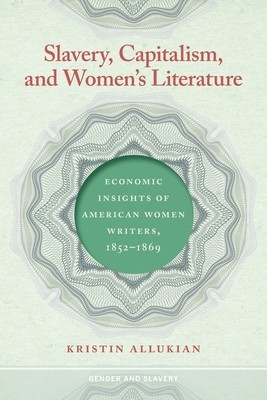
- We will send in 10–14 business days.
- Author: Kristin Allukian
- Publisher: University of Georgia Press
- ISBN-10: 0820364592
- ISBN-13: 9780820364599
- Format: 15.2 x 22.9 x 1.3 cm, softcover
- Language: English
- SAVE -10% with code: EXTRA
Reviews
Description
With Slavery, Capitalism, and Women's Literature, Kristin Allukian makes an important contribution to slavery and capitalism scholarship by including the voices of some of the best-known nineteenth-century American women writers. Women's literature offers crucial and previously unconsidered economic insights into the relationship between slavery and capitalism, different from those we typically find in economics and economic histories.
Allukian demonstrates that because women's imaginative and creative texts take the material-historical connection of slavery and capitalism as their starting point, they can be read for the more speculative extensions of that connection, extensions not possible to discover on a material-historical level. Indeed, Allukian contends, these authors and texts disclose unique economic insights, critiques, and theories in ways that are only possible through literary writing. The writers featured in this study--Harriet Beecher Stowe, Lucy Larcom, Harriet Jacobs, and Frances Ellen Watkins Harper--published written accounts of the continuities between slavery and capitalism including between language and activism, accounting and sentimentalism, labor and technology, race and property, and inheritance and reparations. Their essays, novels, poems, and autobiographies provided forums to document data, stimulate debate, generate resistance, and imagine alternatives to the United States' developing capitalist economy, engined and engineered by slavery. Without their unique economic insights, the national narrative we tell about the relationship between slavery and capitalism is incomplete.EXTRA 10 % discount with code: EXTRA
The promotion ends in 19d.22:15:40
The discount code is valid when purchasing from 10 €. Discounts do not stack.
- Author: Kristin Allukian
- Publisher: University of Georgia Press
- ISBN-10: 0820364592
- ISBN-13: 9780820364599
- Format: 15.2 x 22.9 x 1.3 cm, softcover
- Language: English English
With Slavery, Capitalism, and Women's Literature, Kristin Allukian makes an important contribution to slavery and capitalism scholarship by including the voices of some of the best-known nineteenth-century American women writers. Women's literature offers crucial and previously unconsidered economic insights into the relationship between slavery and capitalism, different from those we typically find in economics and economic histories.
Allukian demonstrates that because women's imaginative and creative texts take the material-historical connection of slavery and capitalism as their starting point, they can be read for the more speculative extensions of that connection, extensions not possible to discover on a material-historical level. Indeed, Allukian contends, these authors and texts disclose unique economic insights, critiques, and theories in ways that are only possible through literary writing. The writers featured in this study--Harriet Beecher Stowe, Lucy Larcom, Harriet Jacobs, and Frances Ellen Watkins Harper--published written accounts of the continuities between slavery and capitalism including between language and activism, accounting and sentimentalism, labor and technology, race and property, and inheritance and reparations. Their essays, novels, poems, and autobiographies provided forums to document data, stimulate debate, generate resistance, and imagine alternatives to the United States' developing capitalist economy, engined and engineered by slavery. Without their unique economic insights, the national narrative we tell about the relationship between slavery and capitalism is incomplete.

Reviews